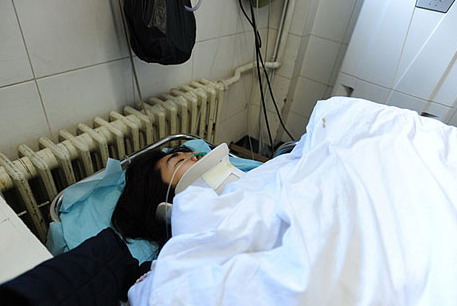Society
- Details
- By David Cao
- Hits: 690
About 41.2 percent of single women in China were worried that they might not be able to find a right person to get married, according to a recent survey.
The figure was almost five times lower in men as only 8.1 single men interviewed admitted that they had the same worry, said the survey, which lasted three years and attracted more than 2.02 million respondents.
The survey also said that some 40 percent women admitted they had high expectations for their future husbands. But 44 percent said they would not lower their standards just in order to get married.
The survey was jointly conducted by the China Association of Marriage and Family Studies (CAMF), the Committee of Match-making Service Industries under the China Association of Social Workers and the Baihe.com, a major Chinese match-making website.
- Details
- By David Cao
- Hits: 748
China's state-owned enterprises (SOE) are being told to be prudent of venturing on the stock and real estate markets amid the complicated and fickle economic conditions.
The centrally-administered SOEs should be vigilant of investment risks and maintain stable operation while resist the temptation of short-term profits, said Huang Shuhe, deputy director of the State-owned Assets Supervision and Administration Commission on Thursday.
"Enterprises should be particularly prudent of investing in the risky stock, futures and property markets," he told more than 100 SOE bosses at a meeting.
Those who had started investment should strictly follow the rules and procedures, he said.
Read more: China urges central SOEs to be prudent of stock, property investment
- Details
- By David Cao
- Hits: 758

A woman receives treatment in a hospital in Beijing. The woman in Beijing narrowly escaped death when she accidentally fell from her 18th floor balcony
A woman in Beijing narrowly escaped death when she accidentally fell from her 18th floor balcony on January 5, cri.cn reported today.
She was airing out a quilt when she fell from her balcony, which is more than 60 meters from the ground, the report said.
She was immediately rushed to the hospital and suffered multiple fractures in her spinal cord.
- Details
- By David Cao
- Hits: 844
Buddhist monk Shi Daoxin's daily routine is not about chanting scriptures, meditating or temple ceremonies - rather, he spends his time listening to different categories of music, updating his blog, exchanging messages and emails with fans, and granting interviews in addition to working on his music.
A self-claimed "art monk", 28-year-old Shi shot to fame in 2008 for his strong resemblance to Hong Kong actor and singer Nicholas Tse. Then controversy followed for his unconventional way of "disseminating Buddhist wisdom and culture through artistic forms".
On the one hand, he has a huge crowd of growing fans, praising and downloading his songs; and on the other, a substantial number of people who question the true motivation of a monk active in the secular entertainment world.
A monk since 14, Shi said he has always been thinking about how Buddhism could keep up with the times.
- Details
- By David Cao
- Hits: 748
The total death toll in the gas pipeline leak in north China's Hebei Province had risen to 21 as company executives confessed to 14 more deaths, said local authorities Friday.
Senior executives of the Hebei Puyang Iron and Steel Co., Ltd. confessed late Thursday night that they had covered up the death toll, according to a statement of Wu'an Municipal Government.
Workers were poisoned while assembling a furnace at 11:45 am Monday in Hebei Puyang Iron and Steel Co., Ltd. when the accident happened.
More Articles …
Page 176 of 255